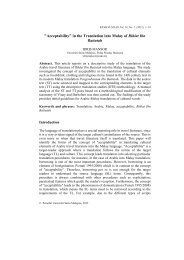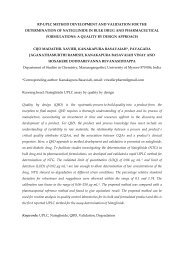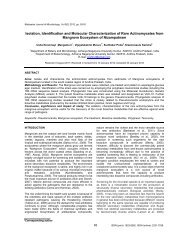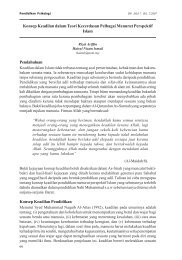ulasan buku/book review - USM
ulasan buku/book review - USM
ulasan buku/book review - USM
You also want an ePaper? Increase the reach of your titles
YUMPU automatically turns print PDFs into web optimized ePapers that Google loves.
123<br />
Kajian Malaysia, Vol. 31, No. 2, 2013, 119–124<br />
workable arrangements that had been put in place earlier by the Fourth Army.<br />
Nor is the situation improved with the introduction of Malay Muslim officers.<br />
The mistrust towards the police is so deep that efforts of dedicated individual<br />
officers or reformist commanders could be readily undermined by the actions and<br />
attitudes of the men on patrol (p. 121). The root problem is that their<br />
organisational culture – heavy drinking, petty corruption and human right abuses<br />
– is just incompatible with the values and beliefs of the Malay Muslims. As he<br />
wrote, "the security policies of the Thai state were a lamentable catalogue of<br />
criminal blunders, negligence, incompetence, lack of coordination and sheer<br />
misdirection. Thailand could not hope to normalise the security situation through<br />
dialogue; militants were only likely to engage in serious negotiations when they<br />
understood that an armed struggle was unwinnable."<br />
The militants and its different shades are covered in the last chapter<br />
which is the most controversial part of the <strong>book</strong>. Based on his readings of the<br />
simultaneous attacks by militants in 2004 on an assortment of military, police and<br />
non-military targets in Pattani, Yala and Songkhla provinces McCargo posed<br />
many question on the militants, its recruitment, structure, whether it is an Islamic<br />
movement, aims, and connections with previous separatist movements. One<br />
crucial element is the use of magic and spells with claims of invulnerability from<br />
bullets by some of the naïve and unthinking attackers who were mostly young<br />
men. These men were easily enlisted for doubtful causes and to McCargo, such<br />
"spectacular display of wild fury by disenchanted Malay Muslim youth do not<br />
bode well for the state's legitimacy and authority in the south."<br />
To McCargo the violence is spearheaded by small cells of locally based<br />
youth who view themselves as fighters in the post-separatist period. They could<br />
easily blend with the surrounding after each sortie. Their recruitment was based<br />
on the invocation of Pattani history, and Malay oppression by the Siamese since<br />
1902 and abuses by myriad types of state officials. He rejected any connection of<br />
the movement with salafist; rather the militants came from the pondoks or Islamic<br />
schools who easily succumbed to jihadist rhetoric while the preponderance of a<br />
traditional form of Islam laced with magical practices clearly indicates the<br />
absence of any modernist influences (Wahabism). Recent studies on the Malay<br />
Muslim educational institutions show the importance of those trained in the<br />
Middle East, Malaysia and Indonesia between the 1950s‒1980s; they held<br />
teaching positions in many madrasahs including those that opened its door to<br />
girls. Surely these modernist teachers must have considerable impact on their<br />
students on the other dimension of jihad – the uplifting of the community through<br />
various form of knowledge.<br />
Tearing Apart the Land is a controversial study of the Pattani conflict. Its<br />
major arguments are based on solid evidence besides well supported<br />
assumptions. Overall the well-crafted <strong>book</strong> is a superb attempt to unravel the<br />
southern conflict in an intelligent manner, to make sense of a senseless violence<br />
which could provide a better understanding to Thais, Malay Muslims and


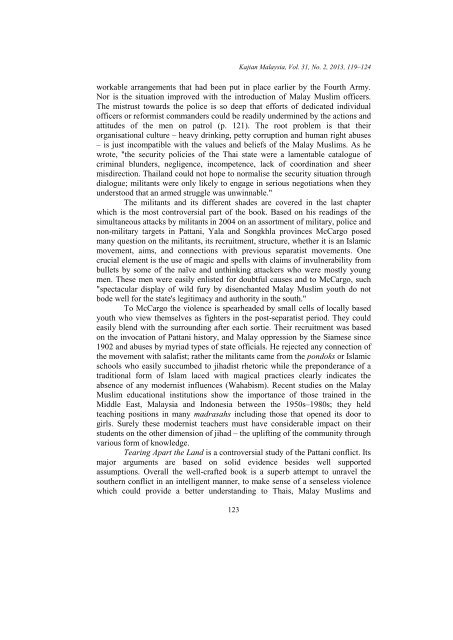
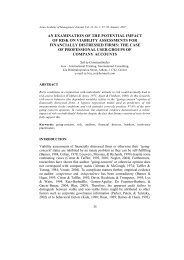

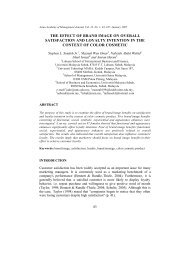
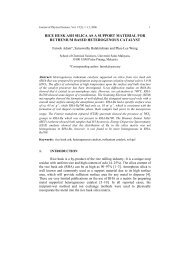
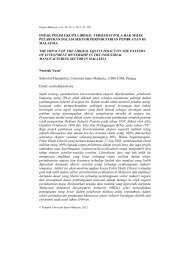
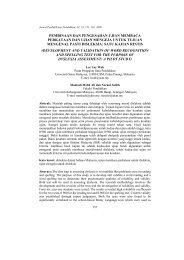
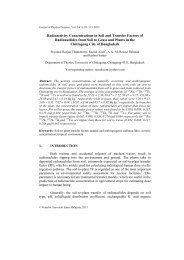
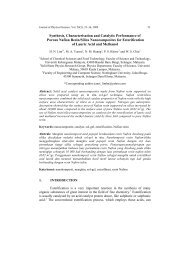

![KTT 111 – Inorganic Chemistry I [Kimia Takorganik I] - USM](https://img.yumpu.com/12405642/1/184x260/ktt-111-inorganic-chemistry-i-kimia-takorganik-i-usm.jpg?quality=85)
